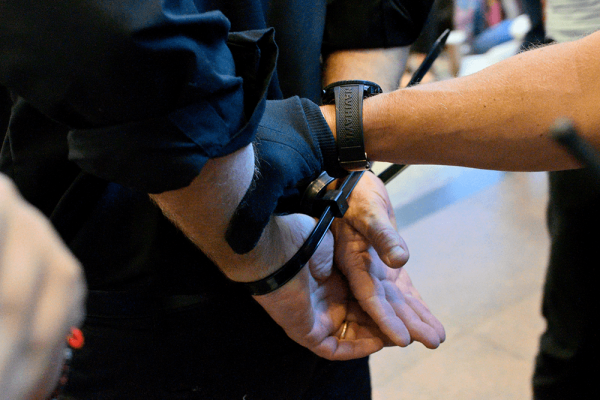After news broke Wednesday that President-elect Donald Trump planned to nix a policy discouraging immigration arrests in places like churches and schools, Indiana pastor Zach Szmara fielded questions from churches across the country about how to prepare.
But he doesn’t yet know what to tell them.
Trump and others in the incoming administration have a habit of “saying all kinds of things they could do,” Szmara noted. Those pronouncements may become policy, or they may be just talk.
“This is what’s been so hard since the election,” Szmara told Sojourners by phone. “How do we prepare communities? How do we not scare communities? There’s so much we don’t know.”
Szmara leads a small, multicultural Wesleyan church in Logansport, an Indiana town that the state’s largest newspaper called “the next Springfield, Ohio,” as it weathered a wave of anti-immigrant sentiment this past fall. He’s also founder and executive director of Immigrant Connection, a network of low-cost legal clinics located inside churches around the country.
During Trump’s first term, Szmara conducted dozens of preparedness workshops across Indiana. Among other things, he told church members that immigrants without legal status “shouldn’t have any fear or anxiety” about seeking medical care or going to church, for example. That guidance was based on longstanding Immigration and Customs Enforcement policy of avoiding immigration enforcement in sensitive locations.
Austin Kocher, a researcher focusing on immigration enforcement, told Sojourners that enforcement agents have for decades generally refrained from making immigration arrests in schools, churches, hospitals, and similar locations.
Some immigrants even sought sanctuary in churches because of this practice, living there for weeks or longer to avoid being detained by ICE agents. Church World Service, which tracks immigrants in sanctuary, reports no one is currently in sanctuary. People who were living in sanctuary received stays of removal or other assurances they did not have to fear being detained.
ICE’s practice of steering clear of churches and other sensitive locations was codified in 2011 and most recently updated in a 2021 memo outlining the policy.
Then-Secretary of Homeland Security Alejandro Majorkas wrote in his 2021 memo that the agency can accomplish its mission “without denying or limiting individuals’ access to needed medical care, children access to their schools, the displaced access to food and shelter, people of faith access to their places of worship, and more.”
As NBC first reported Wednesday, Trump plans to rescind this policy as soon as he is in office. The move echoes Project 2025, a set of policy proposals from the Heritage Foundation which mischaracterized Majorkas’s policy as a prohibition on ICE activity in places such as churches and schools.
Majorkas’s policy, like its predecessors, allows ICE agents to make arrests even in sensitive locations under certain circumstances. “It’s never kept ICE officers out of courts, out of hospitals, out of all these places,” Kocher pointed out.
However, doing away with the policy, as Project 2025 called for, “really opens the door to targeting people of faith,” Kocher said. “It’s about your liberty and my liberty to provide a meal and a place to stay to someone that shows up at my door.”
Kocher considers it “very plausible” that Trump may follow through on rescinding Majorkas’s policy on day one. He noted that the first week of Trump’s first term saw several executive orders with similar tone and substance, including three that sought to expand immigration enforcement. That’s what led to green- card holders and refugees from certain countries being denied entry to the U.S. under the so-called Muslim ban.
The news has already had a “chilling effect” on churches, Kocher added, with some pastors concerned about the safety of their administrative staff should they give some type of assistance to an immigrant without legal status.
Pastors and others at churches “are not checking people’s citizenship and immigration cards at the door,” Kocher pointed out.
For his part, Szmara wonders whether Trump’s administration is “really willing to break longstanding policies” and face potentially “massive pushback.”
“It’s schools and churches and hospitals,” Szmara noted. “It’s like, do you really want to make those unsafe places and communities, or is it just a veiled threat?”
The uncertainty makes it difficult to prepare churchgoers to minister to immigrants at risk of arrest or deportation, Szmara said. But there’s one thing he does know: Christians are called to minister to immigrants regardless of legal status.
“This is an obedience thing,” Szmara said. “God says love immigrants, follow my lead, end of story … It’s a uniquely Judeo-Christian concept.”
And for Szmara, that means more than just helping immigrants assess their pathways to legal status.
“It goes back to what God has always called us to do — cross thresholds and sit at tables,” Szmara said. “The first time someone actually becomes friends with an immigrant family, their life is transformed. That’s what changed my life … All of a sudden I’m not at a distance.”
Got something to say about what you're reading? We value your feedback!







